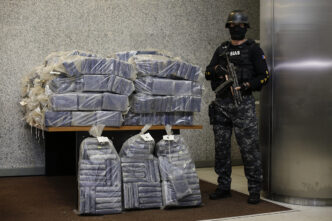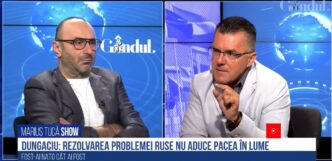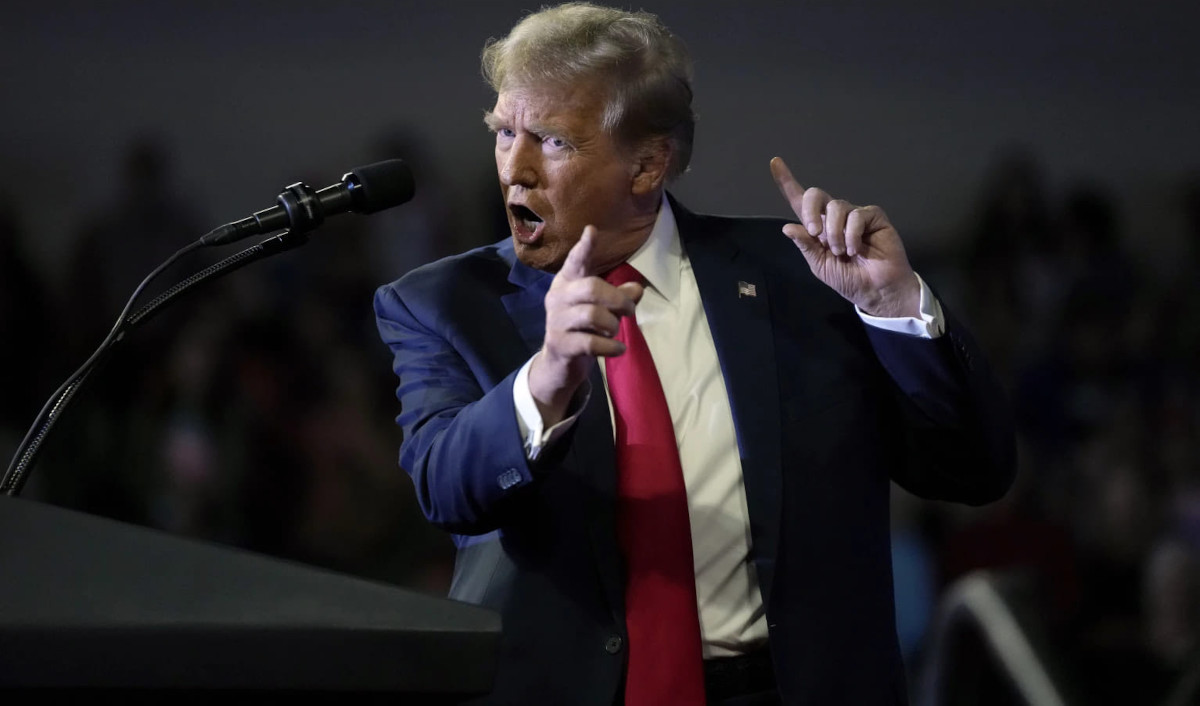
The International Criminal Court has an opportunity for institutional reinvention in the war in Ukraine, a conflict that could become “Putin’s Afghanistan”, transitional justice expert Lavinia Stan explained Wednesday at a conference held at Ovidius University in Constanta.
Lavinia Stan is a professor of political science at St. Francis Xavier University, Nova Scotia, Canada. She is the author of dozens of articles and books on political regimes and transitional justice. She is the coordinator of the Encyclopedy of Transitional Justice. Doctor Honoris Causa of Ovidius University of Constanta ( 2017). Expert for the US government in the post-Saddam Hussein transition in Iraq and for the governments of Libya and Tunisia after the Arab Spring (2010-2012). UN expert on human rights issues in North Korea.
In front of more than 60 people, she presented how transitional justice can be applied in a modern conflict using historical examples and her own experience of over 20 years in the field. The debate was moderated by Dr Emanuel Plopeanu, Dean of the Faculty of History and Political Science at the university.
Transitional justice, also known as transition justice, refers to “how societies respond to the legacy of massive and serious human rights violations”, as explained by the NGO International Center for Transitional Justice. It aims to ask difficult questions from the fields of law, politics and social science and confront countless dilemmas. Above all, however, is the focus on victims.
In this context, Lavinia Stan referred to historical episodes such as the wars in the former Yugoslavia and the genocide in Rwanda, but also to her own experience as an expert working with international organisations during events such as the Arab Spring (2010-2012) to explain, in a speech lasting over an hour and a half, the international community’s reaction to the crimes committed in Ukraine, the institutional mechanisms through which the problem can be tackled from the perspective of transitional justice, the main goals, the potential but also the limitations of such an approach.
Main points
- Transitional justice can be implemented through programmes and initiatives by state actors or civil society to redress the legacy of the recent past, when this past is characterised by large-scale human rights violations.
- From this perspective, experts in the field look at acts carried out mainly by state actors, be it a war, genocide, a campaign of repression and so on.
- The objectives of such programmes include establishing the truth about what happened, punishing those responsible, but also societal reconciliation between victims, perpetrators and witnesses. Measures taken may include legal proceedings against perpetrators, compensation packages for victims, restitution of unjustly taken property, providing access to information, programmes to reintegrate former combatants into society.
- As far as Ukraine is concerned, there are certain advantages that facilitate transitional justice, including the existence of a permanent international criminal authority with jurisdiction over such crimes and the possibility of investigating crimes immediately after they are committed, advantages that did not exist during the Yugoslav wars or the Rwandan genocide.
- However, there are also significant institutional and practical limitations. The overzealousness of people and authorities (national and international) could ironically actually make the duties of competent institutions, such as the International Criminal Court (ICC), more difficult, and the political circumstances and international context make it a difficult task to resolve the issue in a courtroom.
- For the ICC, but also for other institutions, Ukraine represents a moment for institutional reinvention and distancing from past mistakes.
- In the case of Ukraine and beyond, legal processes are important to implement transitional justice, but there are other options. In cases where only some of the goals of transitional justice can be achieved, it is better to pursue that than to try to achieve all of them at the risk of total failure.

To understand why Ukraine is an area of great interest for transitional justice experts, Lavinia Stan explained how important the nature of the crimes committed is and how they are delimited:
- “We only look at human rights violations that are done by the state, by the government (…) Others (deaths, n. ed.) are very important, but they are not cases that I can take a stance on”.
According to this criteria, deaths in Ukraine fall within the area of interest of traditional justice because they are large-scale and can be attributed to state authorities. Even among these, there are certain facts to which the ICC pays particular attention for pragmatic reasons:
- “On the 17th of March this year, the ICC issued an arrest warrant against Putin and the woman who is commissioner (in Russia, ed.) for children’s rights. That is to say, a fabricated title, because children’s rights is the last thing she cares about. The fact that you take children from Ukraine and displace them, that’s a first violation. You displace them from one country to the belligerent country, but then you also put them up for adoption (…) Why out of all the dimensions you could invoke against Russian aggression in Ukraine, the ICC chooses children? Because the ICC has to work not only for truth and justice, but also for its own legitimacy. And then the ICC finds the case to impress everyone! Can anyone say “Sir, I don’t care about the children?” – No!”
According to the expert’s explanation, it is important for the ICC to achieve its goals in Ukraine not only for obvious reasons such as the need for justice for the victims, but also for the pragmatic reason of justifying its existence and activities to the world.
The ICC has been in a race to legitimise itself since the time of its first prosecutor, the famous Argentinian jurist Luis Moreno Ocampo, but it has not been without its critics. For example, until recently, all cases dealt with by the court involved suspects from different African countries, which led to the idea that the ICC suffers from an institutional bias in this respect. Ukraine is an opportunity for the court to show that this is no longer an issue and that “that’s where they’ve killed each other, that’s where we’ve gone”, explains Lavinia Stan.
On top of that, as far as the ICC is concerned, there are other practical limitations, such as the fact that whatever the institution decides, it does not have the authority to arrest Vladimir Putin.
“In the end, it relies on its member states, signatories to the Rome Convention (1998)… Well, Russia is not a signatory. If we want Putin, to whom do we say <>? We can’t just do that!”.

Of course, this does not mean that there are no options in this respect, For example, there is at least a theoretical possibility that Putin could step onto the territory of a state that would be willing to arrest him under the principle of universal jurisdiction, which can apply to particularly serious crimes such as those tried by the ICC. However, this solution has its problems, one of which is that powerful states like the US and China would not apply this principle due to political reasons, according to Lavinia Stan.
On top of that, asked whether it is possible for the war to “freeze”, which could lead to the international community losing focus over time, she says such a scenario is not impossible – Ukraine could become “Putin’s Afghanistan”, and for a long-lasting conflict, international interest may wane.
In any case, the goal of transitional justice goes far beyond the actions of just one court, however competent and powerful. Many of the legal cases will be handled by Ukrainian courts anyway, and transitional justice has other matters to deal with.
A concrete example of this, given by Lavinia Stan, is South Africa immediately in the 1990s, just after the end of Apartheid, the state policy for the separation of ethnic and racial communities that was imposed by extremely brutal measures in the country. Desmond Tutu, an anti-segregation activist and black Anglican bishop, became head of the Truth and Reconciliation Commission, one of the institutions set up to heal the social wounds created by segregation.
In this capacity, he encouraged the granting of amnesty to some of those responsible for violent acts during the years of segregation in exchange for their public confessions. Because of the almost secret and isolated nature of the acts committed, it was not possible to prove them in a court of law in order to punish the perpetrators.
In this tragic context, finding out the truth even at the cost of punishment was considered favourable. Through this method, akin to a confession before the public, important facts and details of many crimes that would have otherwise remained forever lost were revealed.
However, in the case of Ukraine, there are differences. Ukraine is notable for the fact that many of the crimes committed can be investigated almost immediately after they have taken place, which has happened in places like Bucha. In the age of the Internet, information travels much faster and more easily, and the relevant authorities can act more quickly and decisively to pursue justice.
On the other hand, the almost immediate attention that war has attracted and the new technologies have brought their own challenges. Information transmitted over the internet is not always reliable and will not be usable in court. The veracity of evidence is an important element, and this can suffer from the fact that “transitional justice is now fashionable”.
Lavinia Stan’s view is that while many individuals and groups, including national and international authorities, want to help gather evidence and prosecute war crimes in Ukraine, this responsibility should be left to Ukrainian courts, the ICC and specialised investigation teams – in other words, structures that can properly collect and assess evidence.
Despite all the progress that has been made in recent decades, Lavinia Stan concludes with a warning. The war in Ukraine is a time of change, of reinventing certain institutions and creating new attitudes and legal principles, all of which can have unforeseen consequences, a well known fact in the field of transitional justice.
Ne bucurăm că ne citești!
Dacă vrei să ne și susții:











